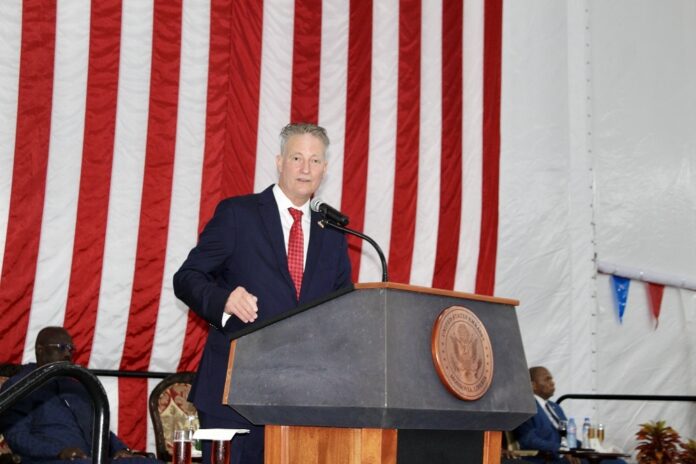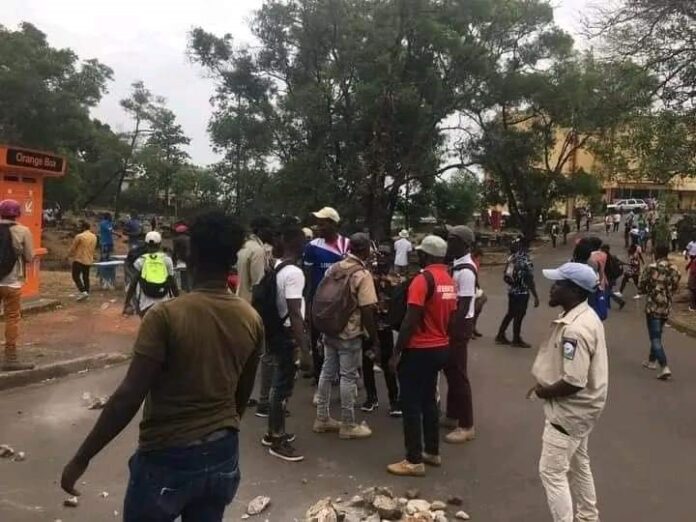Good afternoon! Before I begin, I will first take this opportunity to unconditionally condemn the violence that occurred yesterday at the University of Liberia Capitol Hill campus. Details are still emerging, but I am speaking directly at politicians, student groups, and citizens across the country when I say that violence of any kind has no place in a democratic society. Violence does nothing but undercut your own credibility and will only take this country backwards. Disagreements and competing visions for the country should be solved through peaceful debate and at the ballot box, not on the street.
It is a privilege to introduce you to the State Department’s Global Anti-Corruption Coordinator Richard Nephew and USAID’s Anti-Corruption Task Force Executive Director Shannon Green.
Today’s Roundtable will focus on their visit to Liberia, however, before I turn this over to our guests, there are two items I would like to note for members of the press.
First, in both our U.S.-funded media training and our messaging to the press, we spend a lot of time emphasizing responsible journalism; that with freedom of expression comes an obligation to verify facts, and to not inflame passions without first doing due diligence. Today, I am ashamed to tell you that the most irresponsible controversies to emerge in Liberia’s media over the past month have originated from the United States. While responsible critical observations from the Liberian diaspora can be healthy, some cowardly media personalities and political personalities have intentionally disseminated rumors or misinformation into Liberia’s political environment from the safety of their studios and offices in the U.S. These people are motivated by disruption and a desire to break down trust in Liberian institutions – they don’t care what damage they cause, and when questioned by law enforcement, they do not have evidence to back up their claims. Unfortunately, they take advantage of America’s first amendment rights to spread rumors and stir up trouble in your country, which is despicable behavior.
On a more positive note, my second item is to take this opportunity for a huge “shout out” to Liberia for recent progress in fighting FGM. I was not here for International Women’s Day, but I still wanted to congratulate the Weah Administration, the traditional leaders, the religious leaders, the women’s support groups, UN Women, and UNDP for going far beyond lip service, to take coordinated action to preserve the Sande while fighting the scourge of FGM. Jaha Dukure, the UN Women’s Goodwill Ambassador for ending FGM and Child Marriage and a world-renowned anti-FGM activist, has visited Liberia twice in the last four months. Why? Because she believes that the synergy here today is unique. The momentum of so many actors working together to abolish this practice is so powerful, she believes the practice of FGM in Liberia may actually be eliminated in her lifetime. This is someone who has been fighting FGM for twenty years and is not easily impressed!
The UN, the AU, and women’s rights advocates and other development partners are not asking you to abolish coming of age rituals. No one is suggesting that you should eliminate traditions of training girls in the ways of women. The campaign is only to eliminate FGM/cutting. I implore the legislature to add to this incredible momentum by passing proposed anti-FGM legislation immediately. Is it not fitting that as the oldest republic in Africa, Liberia should abolish this terrible practice that is so harmful to half the population?
So now I would like to move on to today’s primary topic. Embassy Monrovia is privileged to welcome two of our most senior anti-corruption agents, who will talk to you today about their visit to Liberia. As the Liberian public is well aware, the U.S. government is deeply concerned with corruption, globally and especially here in Liberia.
Unlike Mozambique, Liberia is free of hurricanes or typhoons. Unlike Ethiopia, Liberia does not have invasions of locusts. Unlike Cabo Verde, Liberia has plentiful and dependable rainfall. A country that has been blessed with a bounty of resources, there is only a man-made plague that holds back Liberia today: that plague is corruption.
Corruption has been a part of Liberian society for over 200 years. Like FGM, or the tradition of binding feet in China’s history, once corruption is a fully-established way of doing business, it is very difficult to remove. And before anyone draws a conclusion that I am favoring one political party over another, or one administration above another, let me be perfectly clear – corruption in Liberia is far too ingrained and pervasive to pretend it could be that isolated.
Singapore, with only 270 square miles of land, virtually no natural resources, and with a population almost the same size as Liberia’s, had a reputation in the early 1960s as one of the poorest, most corrupt countries in Asia. Singapore’s per capita Gross Domestic Product in 1960 was $428. Today, Singapore is one of the wealthiest countries on the planet, and their per capita Gross Domestic Product in 2022 had risen to $82,794. In comparison, Liberia’s per capita Gross Domestic Product in 2022 was $630. How did this happen? Did they win the lottery? Was it by chance or coincidence? No. One of the primary reasons for the phenomenal success of Singapore, is that they decided corruption would no longer be accepted as a normal part of life.
Like most of you, I have great hopes for Liberia. Like most Liberians, I dream of a better country: one where labor regulations are enforced uniformly without prejudice, and not for personal manipulation or political gain; one where all legislators appropriate funds to a Ministry without the expectation of kickbacks; one where all Ministers negotiate on behalf of what is best for the country, not on the basis of what funds are being paid directly to them; one where public appropriations are distributed as the legislature directed them – not in a random or weaponized fashion determined by individuals; one where schools have no ghost employees and are supplied with the actual number of teachers on their payroll; one where donated medicine is actually available free of charge to the poorest of the poor in public health facilities throughout the country. Liberia can be this country. Just as in Singapore, it is within the power of the Liberian people to make this happen. You can do it!
With that, let me turn this over to our esteemed guests. Unfortunately, I have to step away, but I look forward to seeing you again soon!







